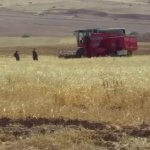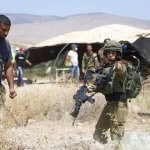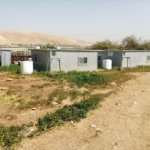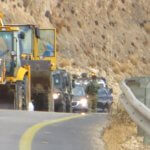Contractor harrassed in Al Jiftlik
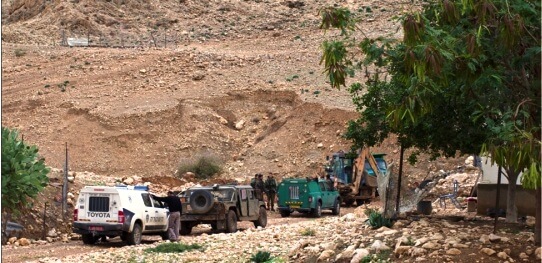 On Saturday morning, the army, police and Nature and Parks Authority confronted Khiar Al-Din Bisharat at his home in Jiftlik, the Jordan Valley. About eight men, six of whom carried heavy weaponry, ordered the confiscation of Khiar’s tractor, on which he, as well as his employees, rely heavily for their livelihood. The reason provided for the confiscation is that Khiar was moving stones in an area designated a ‘nature reserve’, thereby committing an illegal act. This ‘nature reserve’ happens to be five metres from Khiar’s home, in an area where he frequently works.
On Saturday morning, the army, police and Nature and Parks Authority confronted Khiar Al-Din Bisharat at his home in Jiftlik, the Jordan Valley. About eight men, six of whom carried heavy weaponry, ordered the confiscation of Khiar’s tractor, on which he, as well as his employees, rely heavily for their livelihood. The reason provided for the confiscation is that Khiar was moving stones in an area designated a ‘nature reserve’, thereby committing an illegal act. This ‘nature reserve’ happens to be five metres from Khiar’s home, in an area where he frequently works.
In total, 95% of the land of the Jordan Valley is off-limits to Palestinians: 50% is controlled by Israel’s illegal settlements, and the other 45% is military bases, ‘closed military zones’ and ‘nature reserves.’
“What happened is political,” Khiar says, “They don’t want Palestinian people here. They can’t kill us so they use this.”
The army arrested two of Khiar’s workers; Abed who drives a bulldozer as well as Ahmed, a truckdriver. They called Khiar into the police station in the colony of Ariel for questioning. Khiar was told to pay 3,700 shekels to reclaim his tractor. He was forced to spend a night in the prison and now has a court case to attend. He has not been told when it will be held.
This is the second time that this has happened. The first time he was cleaning animal waste around the Bedouin homes of al-Haddidya in the northern Jordan Valley.
“I have a big problem now; I don’t know which place I can work. Tomorrow if I go to work again from another place, maybe they will give me this again. I pay for them. What should I do? For how long can I deal with this?”
Khiar said that if this happens one more time, he will have to give up his work and look for work elsewhere. Indeed, this is Israel’s intention. There is no work in the Jordan Valley, so Khiar will have to look for work in Tubas or Nablus instead, leaving the Jordan Valley. This is part of the Israeli process of ethnic cleansing of the Palestinian people in the Jordan Valley, where arbitrary laws and policies are used to pressure the population to relocate elsewhere. Khiar’s case is not unique, but is rather part of the everyday lives of those living in the Jordan Valley.


